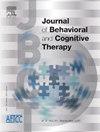The perceived importance of alliance and technique adherence within cognitive behavioural therapy: A comparison of patients’ and therapists’ beliefs
Abstract
Alliance and adherence to therapeutic techniques are key elements of Cognitive Behavioural Therapy (CBT). Therapists’ beliefs about how important alliance and technique adherence are throughout CBT might impact how they deliver therapy. Furthermore, these beliefs might or might not be congruent with patients’ therapy-related beliefs. This research investigated whether therapists hold similar beliefs to patients regarding the importance of alliance and technique adherence throughout CBT and whether therapists could accurately predict patients’ beliefs. CBT therapists (n = 103) and CBT patients (n = 181) rated the importance of alliance and technique adherence to CBT outcomes in early, mid and late therapy. Therapists also predicted patients’ responses. Mann-Whitney U tests compared therapists’ responses and therapists’ predictions with patients’ responses at each stage of therapy. Therapists rated alliance and technique adherence as more important than patients did throughout therapy, with the largest discrepancy for alliance in early therapy. Therapists accurately predicted patients’ alliance importance ratings but underestimated patients’ technique adherence importance ratings for early and mid-therapy. Therapists are encouraged to challenge their assumptions about patients’ therapy-related beliefs by having open discussions with patients. Therapists are encouraged to prioritise technique adherence as well as alliance in early CBT.

 求助内容:
求助内容: 应助结果提醒方式:
应助结果提醒方式:


